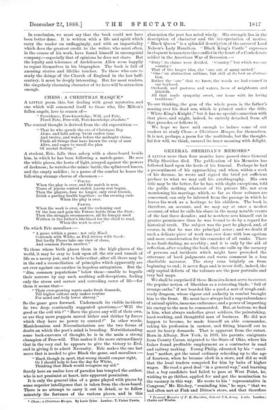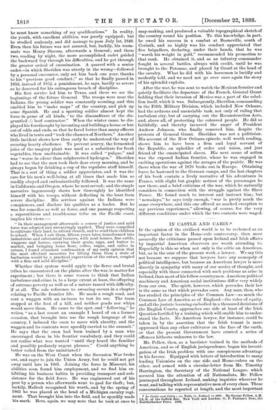GENERAL SHERIDAN'S MEMOIRS.*
A LITTLE more than four months have passed since General Philip Sheridan died. The publication of his Memoirs has followed hard upon the heels of his funeral. Perhaps he had a presentiment of his approaching end when, within a week of his decease, he wrote and signed the brief yet sufficient preface to what we may call his autobiography. His own title may be the better, for he has, with slight exceptions, told the public nothing whatever of his private life, not even
mentioning his marriage, which, so far as these volumes are concerned, can only be inferred from the passage in which he leaves his work as a heritage to his children. The book is, therefore, an account, and we may say at once a modest account, of what he calls his share in the many notable events of the last three decades ; and he nowhere sets himself out in greater prominence than he was bound to do by a regard for historical truth. The subject was the part he played, and, of course, in that he was the principal actor ; and we doubt if such a delicate piece of work was ever done with less egotism and more consideration for his comrades of all ranks. There is no fault-finding, no acerbity ; and it is only by the aid of reflection, after reading the book, that one calls up the memory of persons and incidents which might have provoked the utterance of hard judgments and warm comment in a less charitable narrator. The story runs brightly on from beginning to end ; it never flags and is never dull; indeed, the only capital defects of the volumes are the poor portraits and very bad maps.
We shall be surprised if these Memoirs do not serve to correct the popular notion of Sheridan as a roistering blade, "full of strange oaths," if not bearded like a pard, a sort of rough-and- ready dragoon, whose vigour and audacity in combat brought him to the front. He must have always had a superabundance of animal spirits, immense endurance, and a power of imparting his energy to the men he commanded. But, at bottom, we find in him, what always underlies great soldiers, the painstaking, hard-working, and thoughtful man of business. He did not happen to become, he made himself an able commander, taking his profession in earnest, and fitting himself out to meet its heavy demands. That is apparent from the outset. Born in Albany, New York, in 1831, his parents, emigrants from County Cavan, migrated to the State of Ohio, where his father found profitable employment as a contractor in road and railway making. Young Philip, educated by his " excel- lent " mother, got the usual ordinary schooling up to the age of fourteen, when he became clerk in a store, and did so well that the local traders competed for him by baits of higher wages. He read a good deal "in a general way," and learning that a boy candidate had failed to pass at West Point, he, wishing to go thither, applied for and got the nomination to the vacancy in this way. He wrote to his representative in Congress," Mr. Ritchey, "reminding him," he says, "that we had often met at Fmk and Dittoe's store, and that therefore
• Personal Memoirs of P. U. Sheridan, Gen:rat 11.2. A rtnj. 2 vols. London: Chatto and Winding.
he must know something of my qualifications." In reality, the youth, with excellent abilities, was poorly equipped ; but he studied zealously, and did manage to pass July 1st, 1848. Even then his future was not assured, but, luckily, his room- mate was Henry Slocum, afterwards a General; and these two, reading by night, the more accomplished cadet guided the backward boy through his difficulties, and he got through the greater ordeal of examination. A quarrel with a senior cadet—in which Sheridan was utterly in the wrong—followed by a personal encounter, only set him back one year, thanks to his "previous good conduct ;" so that he finally passed in 1853, instead of 1852, a punishment, he says, hardly so severe as he deserved for his outrageous breach of discipline.
His first service led him to Texas, and there we see the beginnings of the future General. The troops were near the Indians, the young soldier was constantly scouting, and this enabled him to "make maps" of the country, and pick up some Spanish. He and a sporting soldier almost kept the force in game of all kinds, "to the discomfiture of the dis- gruntled (!) beef contractor." When the winter came, he dis- played his forethought by inventing and building a house or hut out of odds and ends, so that he fared better than many officers who lived in tents and "took the chances of Northers" Another little incident shows how thus early he understood the way of securing hearty obedience. To prevent scurvy, the fermented juice of the maguey plant was used as a substitute for fresh vegetables, then unobtainable. It was called " pulque," and was "worse in odour than sulphuretted hydrogen." Sheridan had to see that the men took their dose every morning, and he always began by drinking a cup of the repulsive stuff himself.
That is a sort of thing a soldier appreciates, and it was the care for his men's well-being at all times that made him so readily obeyed and enthusiastically followed. It was the same in California and Oregon, where he next served ; and the simple narrative ingenuously shows how thoroughly he identified himself with his troops, without deflecting in the least from severe discipline. His services against the Indians were conspicuous, and disclose his qualities as a leader. But he was for remedies as well as force, and one passage respecting a superstitious and troublesome tribe on the Pacific coast, implies his views :—
"In their management afterwards a course of justice and mild force was adopted and unvaryingly applied. They were compelled to cultivate their land, to attend church, and to send their children to school. When I saw them, fifteen years later, transformed into industrious and substantial farmers, with neat houses, fine cattle, waggons and horses, carrying their grain, eggs, and butter to market, and bringing home flour, coffee, sugar, and calico in return, I found abundant confirmation of my early opinion that the most effectual measures for lifting them from a state of barbarism would be a practical supervision at the outset, coupled with a firm and mild discipline."
Whether that system would apply to the fierce and brutal tribes he encountered on the plains after the war, is matter for experiment ; but there is some reason to think that Indian turbulence and crime is, to a large extent at least, the offspring of extreme poverty as well as of a nature tamed with difficulty, if at all. The sole reference to swearing occurs in a chapter relating to Pacific frontier life. He made a rough road, and sent a waggon with an ox-team to test its use. The team stopped at the foot of a hill, and neither goads nor whips would move them. He came to the spot, and "following," he writes, "as a last resort an example I heard of on a former occasion, that brought into use the rough language of the country, I induced the oxen to move with alacrity, and the waggon and its contents were speedily carried to the summit." He says that the oxen had been trained by a man who encouraged them in his frontier vocabulary, and they could not realise what was wanted "until they heard the familiar and possibly profanely urgent phrases." Could anything be better veiled from the uninitiated ?
He was on the West Coast when the Secession War broke out, and eager to join the Union Army, but he could not get away until late in 1861. Joining the force in Missouri, his abilities soon found him employment, and we find him ex- hibiting his business habits in providing transport and sub- sistence for the field force. He was engineered out of his post by a person who afterwards went to gaol for theft; but, Halleck recognised his worth, and by the spring of 1862 he was placed at the head of a Michigan cavalry regi- ment. That brought him into the field, and he speedily made his mark. Here, again, we may note that he took at once to map-making, and produced a valuable topographical sketch of the country round his position. To this knowledge, in part, he owed his success in a combat at Booneville, south of Corinth, and so highly was his conduct appreciated that five brigadiers, declaring, under their hands, that he was "worth his weight in gold," recommended his promotion to that rank. He obtained it, and as an infantry commander fought in several battles, always with credit, until he was brought to the Potomac, and placed by Grant at the head of the cavalry. What he did with his horsemen is lucidly and modestly told, and we need not go over once again the story of his splendid exploits.
After the war, he was sent to watch the Mexican frontier and quietly facilitate the departure of the French, General Grant holding that their invasion of Mexico was a part of the rebel- lion itself, which it was. Subsequently, Sheridan, commanding in the Fifth Military Division, which included New Orleans, had the arduous and unenviable task, not only of ruling that turbulent city, but of carrying out the Reconstruction Acts, and, above all, of protecting the coloured people. He did so faithfully, and thereby incurred the anger of President Andrew Johnson, who finally removed him, despite the protests of General Grant. Sheridan was not a politician. His account of the New Orleans episode, well worth reading, shows him to have been a firm and loyal servant of the Republic, an upholder of order and union, and just friend of the emancipated slaves. His next scene of action was the exposed Indian frontier, where he was engaged in exciting operations against the savages of the prairie. -He was there when the war of 1870 broke out in Europe. Obtaining leave, he hastened to the German camps, and the last chapters of his book contain a lively narrative of his adventures in France, with slight but graphic notices of the personages he saw there, and a brief criticism of the war, which he naturally considers in connection with the struggle against the Slave Power. He found much to interest and instruct him ; but "nowadays," he says truly enough, "war is pretty much the same everywhere, and this one offered no marked exception to my previous experiences," allowing, of course, for the very different conditions under which the two contests were waged.











































 Previous page
Previous page